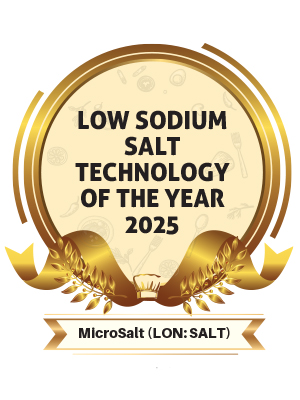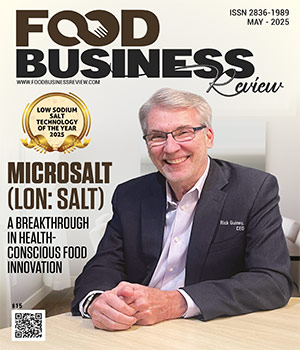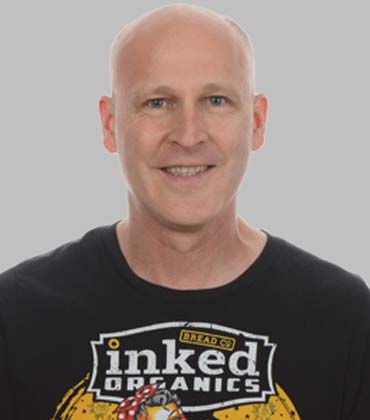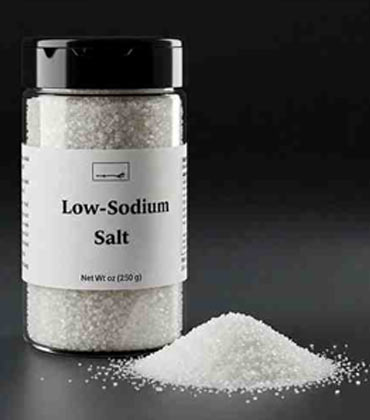Thank you for Subscribing to Food Business Review Weekly Brief
As consumers and regulators push for healthier food options, reducing sodium without sacrificing flavour has become crucial for the food industry. MicroSalt (LON: SALT) has emerged as an innovative leader, offering patented microparticle technology that delivers the same salty taste as traditional salt with approximately half the sodium content. This allows brands to meet regulatory standards and satisfy shifting consumer preferences without compromising product integrity. “We are addressing low-sodium initiatives worldwide in a way the industry has yet to leverage fully,” says Rick Guiney, CEO of MicroSalt. Excessive sodium consumption is closely linked to high blood pressure, heart disease, and stroke. Health organizations, including the World Health Organization and the Centers for Disease Control and Prevention, have set aggressive sodium reduction targets. Countries like the U.S., U.K., and Canada are implementing stricter guidelines, forcing food manufacturers to adapt quickly or face being left behind. At the same time, consumers are increasingly demanding healthier options that retain familiar flavours and textures. However, reducing sodium content in food has traditionally been a complex challenge for manufacturers. Many currently available sodium alternatives alter the taste, change the product’s consistency, or require costly reformulation processes. Despite the growing demand, these obstacles have made widespread adoption of low-sodium alternatives difficult. MicroSalt’s breakthrough technology, however, sidesteps these challenges by using microparticles. The company dramatically enhances surface area exposure by reducing salt particles to a fraction of their standard size. This increased surface area allows food to retain the same salty flavor despite having significantly less sodium. Another key challenge in sodium reduction is ensuring a consistent salty flavour without overcompensating with additional salt. Traditional sodium tends to clump and distribute unevenly, making it difficult for manufacturers to achieve uniform flavour. This inconsistency complicates efforts to reduce sodium while maintaining taste. MicroSalt’s microparticles solve this problem by adhering more effectively to food surfaces, ensuring even distribution across the product. This makes the product taste just as salty as foods with higher sodium content but with a significantly lower sodium level. The innovation also simplifies the integration process for manufacturers, as they do not have to overhaul their existing production lines or recipes. Instead, MicroSalt’s microparticles can be easily incorporated into current manufacturing processes, resulting in a more efficient, cost-effective solution for sodium reduction. Consumer Demand for Transparency and Taste Today’s health-conscious consumers carefully scrutinize food labels, seeking nutritious choices without artificial additives or unpleasant aftertastes common to sodium substitutes. MicroSalt provides an ideal solution: it is all-natural, non-GMO, glutenfree, and free from artificial additives, catering to the growing consumer preference for clean-label products.
Today’s consumers actively choose better-for-you products that not only support their own nutritional needs and well-being but also positively impact the health of our planet. At the same time, these demanding consumers refuse to sacrifice taste and quality. Inked Bread Co., a Certified B Corporation bread company, has been answering this call since 2017 by challenging the norms of the “factory-made” bread industry. Inked Bread is not just about high-quality artisanal bread – Inked genuinely cares about what people put into their bodies. Inked thinks of themselves as “real people with a real purpose.” “Producing some of the best-selling organic and low-carb bread on the West Coast, Inked Bread Co. is a leading innovator of baked goods that support a balanced lifestyle for health-conscious individuals,” says Scott Seymour, CEO. “We use simple ingredients sourced from farmers we know, making it easier for consumers to understand and feel safe with their nutritional choices.” One Bold, Delicious Slice at a Time Inked Bread Co. embodies unwavering dedication, discipline, and authenticity in every slice it creates. The secret of its healthy and delicious offerings lies in fresh, farm-sourced ingredients and artisanal baking techniques, which enables Inked to create high-quality, low-carb (keto-friendly), and better-for-you organic offerings. Inked’s innovative marketing and unique packaging, combined with its dedication to simple, sustainable ingredient sourcing, have created widespread recognition among consumers in top supermarkets like Whole Foods, Costco, Safeway, Sam’s Club, Walmart, Grocery Outlet, and many health and specialty stores. Building on its commitment to quality and nutrition, the team at Inked Bread has created great-tasting breads made with whole grains, real sourdough and low-carb ingredients. The company’s original line-up is organic and was crafted from artisanal recipes developed by the “then” U.S. coach of the World Cup of Bread Baking (the “Bread Olympics”), establishing Inked’s bread as a premium offering in the market. Using traditional methods honed over decades, the company’s signature sourdough is baked with a “30-year-old starter” and requires up to 48 hours of pan-proofing to retain its classic sourdough texture and flavor. Inked’s original line-up consists of Inked Organics’ Great White Bread, Honey Whole Wheat, Mighty Multigrain and Rosie’s San Francisco Bay Sourdough. Inked has since added its organic Super Organic Seeds and a decadent organic bread called Cinna Raisins, which is an organic Cinnamon Raisin bread with Streusel.
Top Commercial Ovens Manufacturer 2025
When building a commercial kitchen, the one piece of equipment that simply can’t be overlooked is the oven. Nearly every plate that graces the dining table owes something to this metal furnace. As the backbone of a restaurant’s success, ovens ensure consistency in every dish—plate after plate. This doesn’t happen by chance, but starts with a reliable equipment provider. Ovention®, Inc. takes pride in being that trusted ally. As an ESOP company owned by Hatco® Corporation, Ovention upholds Hatco’s 75-year legacy of quality and strong industry relationships. The autoload and unload Matchbox ovens, traditional conveyors, and the dual-action conveyor and closed-cavity Shuttle ovens hold the nametag as commercial ovens that chefs trust to simplify kitchen operations and bring culinary visions to life. This one-stop shop oven manufacturer also offers compact ovens for limited counter space like the MiLO, with independently controlled cavities, and the MiSA, a small but mighty microwave assist oven. “Our products are fully designed, supported and manufactured in the U.S. We source up to 99 percent of our components domestically, including steel, electronics and other key materials that make up our ovens,” says Casey Reilley, vice president. Built on the philosophy that kitchen equipment should adapt to the operator and not the other way around, its ventless ovens eliminate the need for costly exhaust systems and expensive HVAC modifications. The result? A more comfortable kitchen environment with lower energy consumption. Thanks to the innovative design of the Matchbox and Shuttle ovens, they reduce heat and noise output while enabling fast, flexible cooking without the need for microwaves—resulting in lower overhead costs and greater kitchen efficiency. With energy efficiency already driving cost savings, the next step is to maximize performance through speed, precision and ease of use. That’s where automation comes in. The company has integrated advanced cooking systems that remove the guesswork from food preparation. No more constant monitoring or manual temperature adjustments— pre-programmed settings ensure consistent, high-quality results with just the push of a button with every single cook.
CXO INSIGHTS

From Good to Great-A Story of Transformation with Culture at the Heart
Hugo Gutierrez, Global Chief Qshe Officer, Kerry

The Art of Maryland Crab: A Chef's Culinary Journey of Flavor and Versatility
Jeffrey Kwolek, Director of Dining - Metz Culinary-Famu, Metz Culinary Management

Building Culture and Connection for Better Guest Experience
Chris Whelan, Dual Director of Restaurants - Moxy and AC Hotels, Marriott International
IN FOCUS
EDITORIAL
Breaking Bread and New Ground
Then comes the harvest. The organic food movement, once a niche, is now a market force—driven by trust, traceability and environmental urgency. However, producing organic at scale means building systems that are as rigorous as the certifications. AI now predicts crop yields by analyzing weather patterns, helping farmers and distributors align demand and delivery. Edible packaging made from seaweed and rice replaces plastic, adding sustainability without compromising shelf life.
With these advancements, the global commercial oven market is projected to grow at a CAGR of 6.7 percent through 2030. Organic food sales are rising even faster, topping 9 percent annually.
The magazine features a thought leadership article by Hugo Gutierrez, Global Chief QSHE Officer at Kerry, who shares a five-year roadmap to building a world-class food safety culture. Another featured article by Eric Ciappio, Senior Manager, Nutrition Science at Balchem Human Nutrition & Health, explores the evolving science of protein intake and how developers can create balanced, high-protein products.
We also spotlight the stories of companies turning nutrition into innovation. One of them is MicroSalt (LON: SALT), delivering full-flavour salty taste with 50 percent less sodium, helping brands meet rising health standards without sacrificing flavour.
The magazine features Low Sodium Salt Technology of the Year 2025, Top Commercial Ovens Manufacturer 2025 and Top Organic Food Company 2025; we hope you find the right partner to meet your organization’s needs.
Let us know your thoughts!










